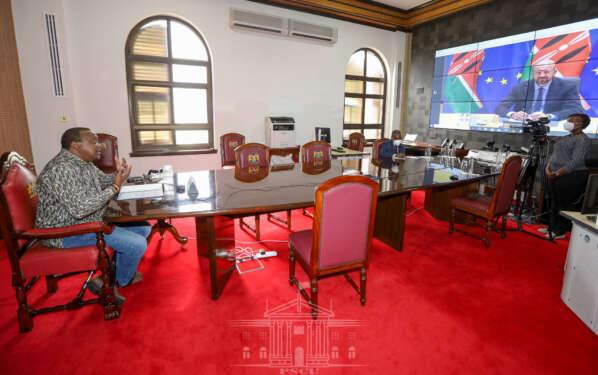Kenya is keen on strengthening trade and investment ties with Europe, President Uhuru Kenyatta has said.
According to the Kenyan embassy in Brussels, Kenya has enjoyed a longstanding cordial association and trade relations with the European Union, under the framework of the successive Lomé Conventions and the Cotonou Agreement.
The cooperation began in the 1960s, prior to the Lomé Convention, and has been in the areas of, inter alia: development finance, trade, political, industrial development, energy, socio-cultural, regional cooperation development, agriculture and environment, with the objective to increase export income, promote industrialisation, and promote economic growth of developing countries.
To achieve these objectives, the European Union (EU) provided Kenya and other ACP countries preferential market access for primary products, essentially agriculture and other agro-based products, together with funds and other forms of assistance towards trade and private sector development. The preferences have been non-reciprocal, and are in the form of lower tariffs and/or tariff exemption in value-added (manufactured) products and agricultural products, provided they pose no direct competition with the East African Community products and do not discriminate among EU member states in terms of tariffs charged on their imports to Kenya.
The arrangement has benefited Kenya, particularly in the areas of horticulture and fisheries, due to the production and supply capacity potentials, and other agricultural products like tea, coffee, and sugar. ACP member states benefited at different levels, depending on their production and supply capacities. Surveys carried out show that ACP states that had production and supply capacity performed better in terms of exports compared with non-ACP developing countries that are at the same level of economic development.
“As you know for sure not only do we share a common historical heritage but the European Union is without doubt our largest single trading bloc. And that does not only apply to Kenya, it applies basically to the entire continent (Africa),” President Kenyatta said.
The Head of State expressed the need for the EU to work closely with Kenya to give private sector players the confidence to invest in Kenya and create jobs for the youth.
“This is where we can work together to see how we can encourage private sector players to come in and through their investment fill in our development gap, grow prosperity, create employment and create hope for our young people,” President Kenyatta said.
Currently, Kenya’s exports to the EU are mainly agricultural commodities such as cut flowers, fruits and vegetables, which account for over 90% of total export value. Others are tea, coffee, fish and fisheries products, sugar, semi-processed tobacco, textile and clothing, coffee and handicrafts, among others. Though trade with the EU is heavily in its favour, it remains Kenya’s second largest market after COMESA. The United Kingdom, Germany, the Netherlands and France are leading EU destinations of Kenyan exports.
Kenya’s exports to this market have been growing significantly since the 1990s, due to the immense growth in the horticultural sub-sector. Overall, Kenya’s exports to EU have risen steadily over the past years by an average of over 14%, and were estimated at KSh. 89 billion in 2008.
The EU is Kenya’s major single source of imports, mainly industrial (finished) products such as motor vehicles and parts, aircrafts and associated equipment, medicaments, iron and steel products, data processing instruments, rubber tyres and other articles of rubber and plastic, medical and veterinary instruments, motor machinery, telecommunication equipment, electrical and electronic goods, refrigeration equipment, food processing machinery, refrigeration equipment, paper and paperboard, farm chemicals, textiles and clothing, and hides and skins.
The Head of State spoke Tuesday at State House Nairobi during a virtual meeting with the President of the European Council Charles Michel.
Also Read: Tanzania denounces rumours of EU Sanctions
President Kenyatta also proposed a change of approach in the Africa-Europe cooperation model to make it more commercially oriented where the private sector will invest on the basis of returns but at the same time create opportunities for the continent.
On his part, Mr. Michel agreed with President Kenyatta that there was need for Kenya and the rest of Africa to deepen their mutually beneficial partnership with Europe.
Mr. Michel said the global Covid-19 pandemic had presented Africa and the European Union an opportunity to strengthen their ties in sectors such as health, infrastructure and governance.
The two leaders further discussed regional security and Kenya’s membership to the UN Security Council and agreed on the need to end the fighting in Ethiopia saying the conflict is a threat to the stability of the entire Horn of Africa region.
